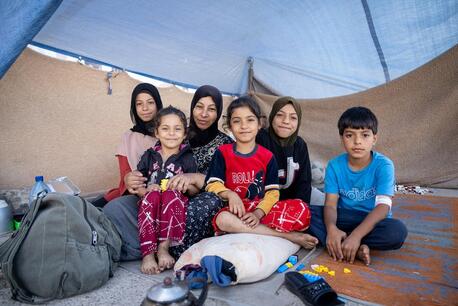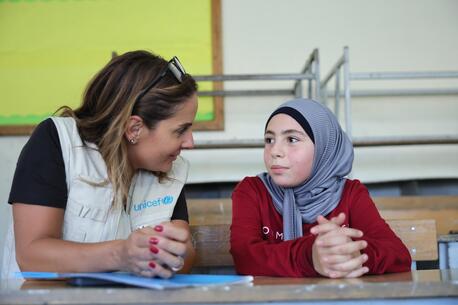
Support for Young Sexual Violence Survivors in Guatemala
A UNICEF-supported program delivers home-based counseling services to young people recovering from sexual assault in Guatemala.
For every reported case of sexual abuse in Guatemala, an estimated five cases go unreported
It is 11 in the morning, and the scorching heat of the coast feels relentless. On the horizon, thunder announces an approaching storm as Luna* and her mother, Isabel*, walk back from the market, crossing one of the dangerous areas of their community.
Luna was a victim of sexual violence. A few months ago, she was working out of necessity in a small establishment in the neighborhood, located near several brothels. One afternoon, while she was alone working, a man came in and, without anyone there to protect her, Luna was sexually abused.
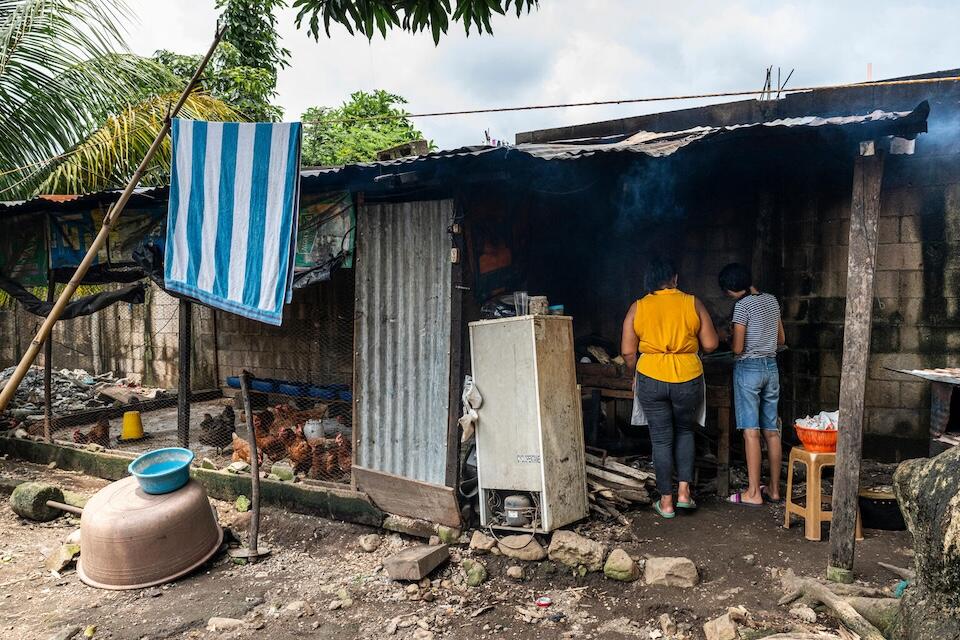
Sexual violence against children and adolescents constitutes one of the worst forms of violence. In Guatemala, according to data provided by the Public Ministry in 2023, there were 17 daily reports related to this crime, affecting over 6,261 children and adolescent victims.
Furthermore, statistics from the Ministry of Health and Social Assistance reflect that 62 percent of the victims are aged 10 to 19, while in the case of boys, 60 percent are between 4 and 14 years old. Despite the alarming nature of the data, the true magnitude of sexual violence is greater, as it is estimated that for every reported case, there are five unreported cases.
After the attack, Luna began to change; she fell into depression, with dark thoughts, and even reached the point of wanting to take her own life. Isabel remarks that she found out later when she noticed that Luna no longer wanted to go to school and that she looked quite depressed.
Watch the video:
The first drops of rain begin to fall, softly hitting the metal roof as Luna, alongside her mother, prepares fresh cheese in the small kitchen. The smell of freshly made cheese mixes with the humid air of the approaching storm. Suddenly, a gentle knock on the door interrupts the moment. It’s Aleida, the psychologist from UNICEF-supported Voz de la Niñez (Voice of Childhood), who has been supporting Luna.
When Luna opens the door, she greets Aleida with a big hug, filled with gratitude and affection. The rain begins to intensify, so they hurry to take shelter in the chicken coop, one of Luna's prides.
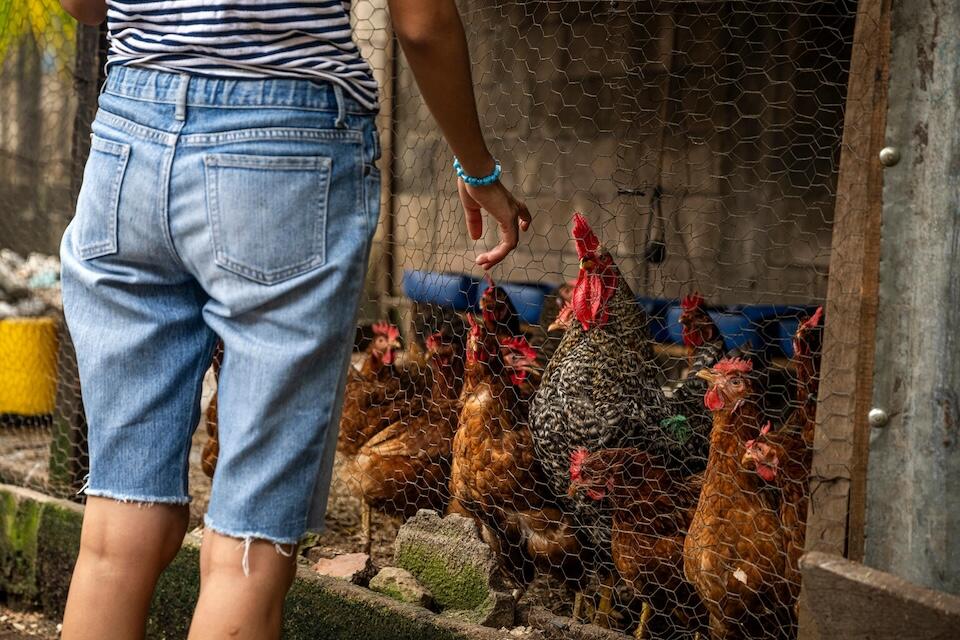
Home visits from a trained psychologist help survivors cope with the trauma they've experienced
The small coop is more than just a simple venture; it represents part of Luna's healing process. It was an initiative proposed by Aleida as part of her therapy, helping her reconnect with life and find purpose. As the sound of raindrops mixes with the clucking of the chickens, Luna smiles, finding comfort in caring for her project.
The rain passes as quickly as it arrived. The sun, shy at first, peeks out from behind the clouds, illuminating the house and coop. Luna feels calmer under the warmth of the sun, and while the chickens peck at the damp ground, Aleida takes advantage of the moment.
With a smile, she takes out her teaching materials. It’s time to continue the mental health support. Aleida has been a pillar in Luna's healing process, guiding her with patience and empathy. Sitting in the patio, they begin a new session. For Luna, these moments are a safe space where she continues to rebuild the pieces of herself that once felt broken.
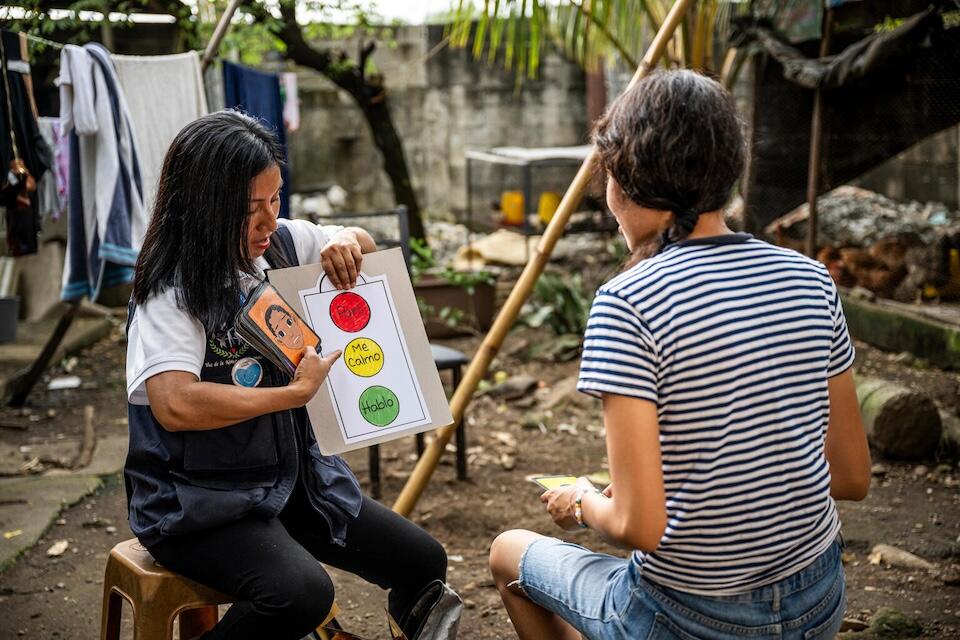
In Guatemala, 7 out of 10 cases of sexual violence involve a close relative
“UNICEF and Voz de la Niñez have been a blessing because they have been a great help for us to get through this,” Isabel says at the end of the session.
Thanks to the support of the governments of Sweden and the United States, UNICEF has been able to assist more than 1,300 children who are victims of sexual violence, out of the 6,200 that are reported annually to the Public Ministry.
Dora Alicia Muñoz, Protection Officer at UNICEF, regrets that this is a reality affecting children's rights in Guatemala and emphasizes that there is still much work to be done.
In Guatemala, in 7 out of 10 cases of sexual violence, the abuse is committed by a close relative.
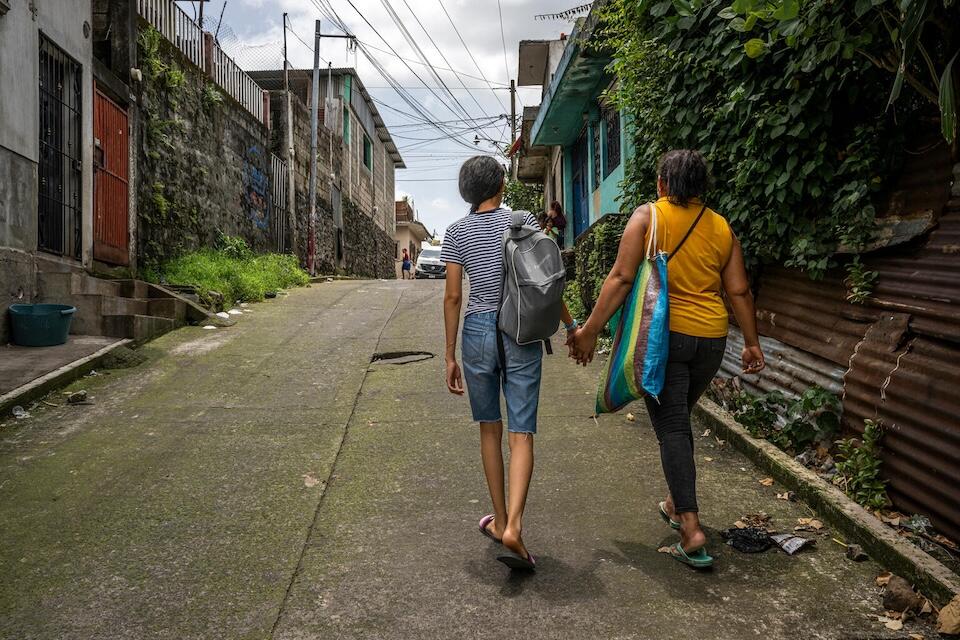
Local radio campaigns and family workshops help prevent sexual violence
“We also work on the prevention of sexual violence through local radio and workshops with families and children. These are conducted in the local language to achieve behavior change in the communities, where we inform and raise awareness about the importance of not normalizing sexual violence, the risk factors and elements for the protection of children,” says Dora Alicia.
After some time spent in therapy, Luna gets up, goes into her house, and comes back with a painting she has been working on for weeks. It is one of her own initiatives, a reflection of her personal healing process. She holds it carefully, as if it were something precious, and places it in front of Aleida.
In the painting, a small worm slowly crawls along the ground. Luna describes it simply: “It’s sad and ugly,” she says, pointing to the insect in its initial stage. However, the worm does not stay there. In the scene, it struggles to climb up the trunk of a sturdy tree, clinging to its branches. Through a slow but steady process, the worm transforms, wrapping itself in its cocoon. Finally, it emerges as a brightly colored butterfly, gracefully unfolding its wings.
“Before, I felt very sad and didn’t want to go to therapy. Now I feel very happy; now I see that life has meaning and I want to live,” says Luna.
Before, I felt very sad and didn’t want to go to therapy. Now I feel very happy; now I see that life has meaning and I want to live. — Luna, 17
As Aleida begins to say goodbye to Luna, she says, “Seeing that change in her, the smile she radiates, the sparkle in her eyes is such a great satisfaction, knowing that through the support we provide, we were able to save a life.”
As Aleida finishes gathering her materials and prepares to leave, she looks at Luna with a warm smile and asks her about her future.
“My goal is to be a professional nurse and be able to help people,” Luna says.
UNICEF works with partners around the world to prevent and respond to all forms of violence and abuse against children. Your contribution can make a difference. Please donate today.
Luna and Isabel's names have been changed to protect their privacy.
Learn more about UNICEF's child protection work.
This story originally appeared on unicef.org
HOW TO HELP
There are many ways to make a difference
War, famine, poverty, natural disasters — threats to the world's children keep coming. But UNICEF won't stop working to keep children healthy and safe.
UNICEF works in over 190 countries and territories — more places than any other children's organization. UNICEF has the world's largest humanitarian warehouse and, when disaster strikes, can get supplies almost anywhere within 72 hours. Constantly innovating, always advocating for a better world for children, UNICEF works to ensure that every child can grow up healthy, educated, protected and respected.
Would you like to help give all children the opportunity to reach their full potential? There are many ways to get involved.



